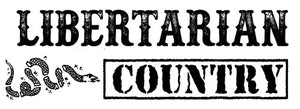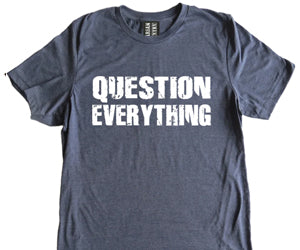In these days of mass media confusion and political chaos, it is easy to be suspicious of everyone, even venerable and reputable institutions. Everywhere we look there may be lurking some malevolent agenda or conspiracy. Nobody can be trusted and everyone is a suspect.
How do we know that the professionals, experts, scientists, professors, public health officials, non-profit organizations, and the time-tested news media aren't in cahoots with nefarious characters plotting skullduggery and malfeasance?
How do we balance ourselves on this informational tightrope walk? How do we maintain our equilibrium while being drugged by a mass plethora of contradictory data? How do we prevent ourselves from drunkenly stumbling and falling into the abyss of abject delusion or naive credulity?
Accepting the established ideologies and the dominant opinions of the status quo without a blemish of questioning is oftentimes just as patently erroneous as accepting a wild conspiracy theory without a shadow of evidence.
Despite a deep awareness of things feeling not quite right, there is inevitably a push toward accepting either the mainstream narrative or the underground narrative, oftentimes both requiring equal gullibility.
Fortunately, there is a third option that is typically overlooked which allows us to deflect both eagerness to believe the authorities and jumping into the shallow end of a pool of conspiratorial balderdash. The middle ground between the two is intelligent skepticism.
How does an intelligent skeptic differ from the aforementioned categories?
Evidence-Based Reasoning
The conspiracy theorists and the intelligent skeptics may start from the same place. That is a place where the mainstream authorities' claim appears to be fallacious or is missing context or is seemingly intended to manipulate the general population.
Both start out disbelieving the official story. Both start by questioning the narrative in front of them.
However, the intelligent skeptic stays on the path of reason, logic, and evidence. He does not derail and veer off into believing a different narrative just because it's not widely accepted by the status quo.
The intelligent skeptic knows that to validate his hypothesis, he needs to have evidence. Yes, obtaining that evidence may take some time, but he knows that eventually, he will have to verify his suspicions with testable data. He knows that without proof, he must, in the end, relinquish his theory.
"That which can be asserted without evidence can be dismissed without evidence" -Christopher Hitchens.
Truth is Not About Being Right
Challenging the accepted doctrines of our time is essential to world progress. If those in the past did not question widely held beliefs, we would never have evolved. Science and reason are dynamic, meaning that it is always subject to revision.
If we were to dogmatically absorb everything as fact, the pursuit of knowledge and truth would cease to be. Some of the greatest achievements in human history would be impossible without questioning everything.
As illustrated, skepticism is highly valuable, but it also has internal limitations. Believing that everything is wrong without evidence is just as foolish as believing everything is correct without evidence.
We must have the emotional and intellectual integrity to abandon our theories if there aren't any facts to back them up.
Our devotion should be to the truth, not to being right.
The Burden of Proof.
The burden of proof simply means that if we make a claim, we must demonstrate how it is factual. We cannot hold a theory or belief and make others disprove it. For example, "I believe in ghosts, they're real because you cannot prove that they do not exist."
It is always up to those who assert something to back it up with evidence and proof, not the charge of everyone else to show how it is flawed. It is a logical fallacy to cling to a belief as being true simply because someone else hasn't refuted it.
Now, the waters get a little muddy when we talk about the established institutions relaying information to the public. If a government or a public health official makes a claim, the burden of proof is still on them, but there is also an informational asymmetry that has to be considered.
Information Asymmetry
Those in highly powerful positions naturally possess more authority over information than the average person who questions them.
Institutions and entities may even be able to use their power to manufacture a consensus among experts, or even pay for them to skew material to favor the claims of the powerful. They also have the power to suppress conflicting data that might cast more doubt on their claims.
The appeal to authority does not necessarily mean that those in power are telling the truth nor does it mean they are fabricating lies. So what is real and what is not, and how can you know?
The reality is that the burden of proof will always fall back on those who challenge the established doctrines, the established professionals, and the authorities. This is because those in power have access to individuals who can present information in their favor. They have the studies to show that they're correct.
As it has always been said, the only thing that can disprove science is better science. This is true even when we "know" the authorities are wrong.
However, the skeptic cannot be expected to falsify the claims of powerful institutions overnight. They must be given a grace period to collect their data. They must be graciously given a window of time to allow for new information to emerge that may contravene the dominant evidence.
The public at large should not go on a frenzy to punish the skeptic but compassionately give them room to question.
As said above, after so much time has passed, they should be prepared to relinquish their theory and accept that they are wrong, or at least yield that there is "currently not enough information to determine one way or another".
We must always follow the evidence where it leads us. No amount of belief makes something a fact. If the authorities are lying, the skeptic must prove it. It is not the rest of the world's responsibility to disprove every hypothesis or theory that the skeptic presents. We must never turn our backs on the scientific method.
If we maintain our intelligent skepticism and stick to facts and science without veering off into delusion, we will be victorious in the end as the truth emerges from the ignoble, perilous shadows.
If you enjoyed this insightful content, check out What Has The Government Ever Done To Earn Your Trust?




